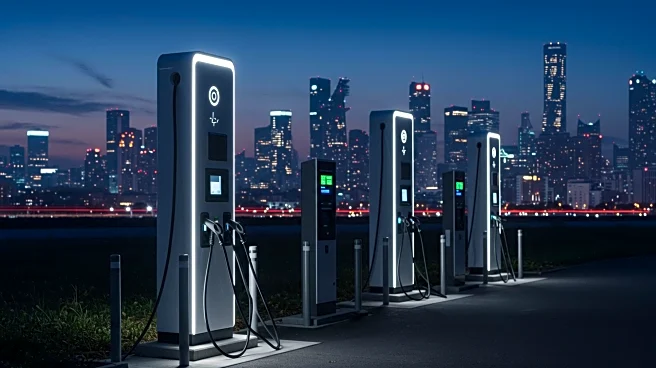What's Happening?
BYD, a Chinese electric vehicle manufacturer, has climbed to the 91st position on the Fortune Global 500 list, marking a significant leap from its previous rank of 143 in 2024. The company reported a 29% increase in annual revenue, reaching RMB 777.1 billion (approximately USD 107.1 billion), and achieved a record in new energy vehicle sales with 4.27 million units sold, representing a 41% year-on-year growth. BYD's technological innovations, including the Blade Battery and Megawatt Flash Charging, have been pivotal in its growth, supported by substantial R&D investments that exceeded its net profit for the period.
Why It's Important?
BYD's rise on the Fortune Global 500 list underscores its growing influence in the global electric vehicle market, which is crucial as the world shifts towards sustainable transportation solutions. The company's success reflects the increasing demand for new energy vehicles, which could lead to a reduction in reliance on fossil fuels and contribute to climate change mitigation. BYD's expansion into international markets, with NEVs available in 112 countries, positions it as a key player in the global automotive industry, potentially impacting competitors and driving further innovation in the sector.
What's Next?
BYD is expected to continue its expansion into foreign markets, with ongoing localization efforts such as establishing a European headquarters in Hungary and a factory in Brazil. The company's focus on technological innovation and electrification suggests it will maintain its growth trajectory, potentially increasing its market share and influencing global automotive trends. Stakeholders, including competitors and policymakers, may respond by accelerating their own electric vehicle initiatives to keep pace with BYD's advancements.
Beyond the Headlines
BYD's commitment to electrification highlights the ethical and environmental dimensions of its business strategy, emphasizing the importance of sustainable practices in the automotive industry. The company's efforts to 'Cool the Earth by 1°C' reflect a broader cultural shift towards prioritizing climate action, which could inspire other corporations to adopt similar values and contribute to global sustainability goals.










